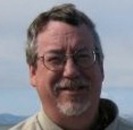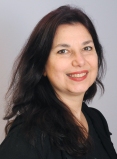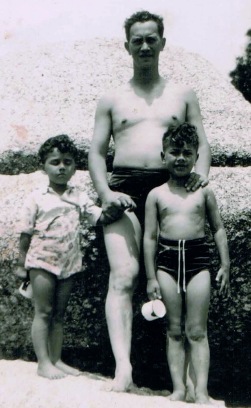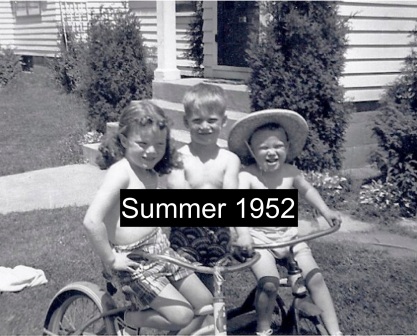
A Short Dive from the Low Board
by John Lambremont, Sr.
That summer, the sun beat down on us
like it was the Devil himself;
we scampered for shade
into the thickest woods,
and drank a lot of hot water
from the garden hose.
The neighborhood pool was our savior,
our clear crystal blue oasis.
As soon as our summer membership began,
Mom started taking us to the pool
nearly every morning in June,
and we would often return again
with Dad late in the day.
On one sunny sojourn,
the Lackie twins and I
had the diving board
to ourselves; we performed
cannonballs and can openers,
jack-knives and swan dives
to our collective hearts’ content;
then we noticed that the lifeguard
had left temporarily his nearby post,
so we quickly concocted a plan.
We decided that the thing to do
was to all jump off the board
in rapid succession, taking
care not to land on each other,
so we prepared for the leap,
John in front, me in the middle,
and Jim taking up the rear.
John ran off the board,
and as I started to follow him,
I saw the lifeguard emerge
from the snack shop,
looking directly at me,
his face contorted with anger,
and about to shout, blow
his whistle, or both.
Busted, I stopped at mid-
board, and tried to turn around,
but in so doing, I ran into Jim,
lost my balance, and fell off
to the side like a poul-doux
being shot from the sky.
Time slowed to a crawl
as I rapidly descended;
I had no time to extend
my arms, and I landed
face-first on the concrete.
Stunned and numb, I drew
myself to my knees, checked
my face for blood, and found none.
My vision was awash in waves
as I staggered to my feet
and wobbled over to my mother
in her pool-side recliner.
She comforted me as I cried,
for once not scolding me
for doing a bad thing.
Jim got off the board gingerly,
and went to the spot where I fell.
He found there a small piece
of chipped tooth, picked it up,
and brought it to my mom.
She wrapped it up in a damp napkin,
summoned my little sister,
and took us home.
Dr. Lorio gave her concussion instructions,
and held me out of two baseball games.
The dentist said there was no way
to re-attach the chip, but that a cap
on the tooth was a viable alternative.
I declined, and to this day, one
can still see the chip in my upper incisor,
a permanent reminder of my
short dive from the low board.
PHOTO: “Boy jumping off diving board” by Kelly Redinger. Prints available at fineartamerica.com.

ABOUT THE AUTHOR: John Lambremont, Sr., is a poet and writer from Baton Rouge, Louisiana. John has a B.A. in Creative Writing and a J.D. from Louisiana State University. His poems have been published internationally in many reviews and anthologies, including Clarion, The Minetta Review, The Chaffin Journal, Picayune, and Words and Images, and he has been nominated for The Pushcart Prize. John’s last full-length poetry volume is Dispelling the Indigo Dream (Local Gems Poetry Press 2013), and his latest chapbook is What It Means To Be A Man (And Other Poems Of Life And Death) (Finishing Line Press 2015). John’s new full-length poetry collection, The Moment Of Capture, will be published in June 2017 by Lit Fest Press.






















